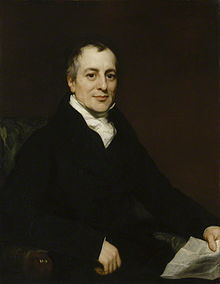 Global Information
Global InformationDavid Ricardo information
The Right Honourable David Ricardo | |
|---|---|
 Portrait by Thomas Phillips, c. 1821 | |
| Member of Parliament for Portarlington | |
| In office 20 February 1819 – 11 September 1823 | |
| Preceded by | Richard Sharp |
| Succeeded by | James Farquhar |
| Personal details | |
| Born | 18 April 1772 London, England |
| Died | 11 September 1823 (aged 51) Gatcombe Park, Gloucestershire, England |
| Political party | Whig |
| Children | Including David the Younger |
| Profession |
|
| Academic career | |
| School or tradition | Classical economics |
| Influences | Ibn Khaldun · Smith · Bentham |
| Contributions | Ricardian equivalence, labour theory of value, comparative advantage, law of diminishing returns, Ricardian socialism, Economic rent[1] |
| Part of a series on |
| Capitalism |
|---|
|
| Part of a series on |
| Economics |
|---|
|
|
|
| This article is part of a series on |
| Liberalism in the United Kingdom |
|---|
 |
|
| Part of a series on |
| Liberalism |
|---|
 |
|
David Ricardo (18 April 1772 – 11 September 1823) was a British political economist, politician, and member of the Parliament of Great Britain and Ireland. He is recognized as one of the most influential classical economists, alongside figures such as Thomas Malthus, Adam Smith and James Mill.[2][3]
Ricardo, born in London as the third surviving child of a successful stockbroker and his wife, came from a Sephardic Jewish family of Portuguese origin. At 21, he eloped with a Quaker and converted to Unitarianism, causing estrangement from his family. He made his fortune financing government borrowing and later retired to an estate in Gloucestershire. Ricardo served as High Sheriff of Gloucestershire and bought a seat in Parliament as an earnest reformer. He was friends with prominent figures like James Mill, Jeremy Bentham, and Thomas Malthus, engaging in debates over various topics. Ricardo was also a member of The Geological Society, and his youngest sister was an author.
As MP for Portarlington, Ricardo advocated for liberal political movements and reforms, including free trade, parliamentary reform, and criminal law reform. He believed free trade increased the well-being of people by making goods more affordable. Ricardo notably opposed the Corn Laws, which he saw as barriers to economic growth. His friend John Louis Mallett described Ricardo's conviction in his beliefs, though he expressed doubts about Ricardo's disregard for experience and practice. Ricardo died at 51 from an ear infection that led to septicaemia (sepsis). He left behind a considerable fortune and a lasting legacy, with his free trade views eventually becoming public policy in Britain.
Ricardo wrote his first economics article at age 37, advocating for a reduction in the note-issuing of the Bank of England. He was also an abolitionist and believed in the autonomy of a central bank as the issuer of money. Ricardo worked on fixing issues in Adam Smith's Labour Theory of Value, stating that the value of a commodity depends on the labour necessary for its production. He contributed to the development of theories of rent, wages, and profits, defining rent as the difference between the produce obtained by employing equal quantities of capital and labour. Ricardo's Theory of Profit posited that as real wages increase, real profits decrease due to the revenue split between profits and wages.
Ricardian theory of international trade challenges the mercantilism concept of accumulating gold or silver by promoting industry specialization and free trade. Ricardo introduced the concept of "comparative advantage," suggesting that nations should concentrate resources only in industries where they have the greatest efficiency of production relative to their own alternative uses of resources. He argued that international trade is always beneficial, even if one country is more competitive in every area than its trading counterpart. Ricardo opposed protectionism for national economies and was concerned about the short-term impact of technological change on labour.
- ^ Miller, Roger LeRoy. Economics Today. Fifteenth Edition. Boston, MA: Pearson Education. p. 559
- ^ Sowell, Thomas (2006). On classical economics. New Haven, CT: Yale University Press.
- ^ "David Ricardo | Policonomics". 30 January 2012.